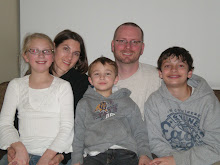It was a very long day today. We started off the day with a nice long meeting with a geneticist, Janet Williams, whom so graciously agreed to meet with us. After giving the medical history of Rob's family, it was determined that there really isn't a familial correlation with the cancer. They cannot rule out our children being high risk, but they also cannot rule out them having no risk. (How is that for an answer?)
At this time, there are no studies (that she could find) in which Rob can enroll. However, there is one study in which he could qualify if he has at least two other members of his immediate family with the same cancer. I may be completely off base, but I am guessing that none of his siblings or parents want to volunteer. (Let me know if you start having back pain, weird breathing, or other known lung cancer symptoms such as coughing up blood. We know an amazing pulmonologist.)
After the informative meeting, we met with Rob's radiation oncologist, John Thomson. Thursday evening, he held a meeting with other radiation oncologists from Logan to St. George (the northern to southern regions of Utah - in case you are not familiar with our geography). After presenting Rob's case, there was some discussion as to what these doctors would do, if Rob was their patient. They voted six to one in favor of NOT administering radiation again - at this time. That is to say, they are not ruling it out for the future.
I suppose that, that is good news??? When administering radiation, they are very careful to only use a 'safe' (I use that term loosely) levels for treatment. Last cancer go-round, Rob's heart received a quarter of that safe amount and his spinal column received half of the amount. Since, more than likely, they would radiate the same area, it would be a little risky (this is me talking, not the doctors).
To top off the day, we met with Rob's oncologist, Greg Litton. We got a little more information on the tumor that was sent to Denver. 'They' are looking to see if the tumor has certain EGFR markers:
EGFR
The protein found on the surface of some cells and to which epidermal growth factor binds, causing the cells to divide. It is found at abnormally high levels on the surface of many types of cancer cells, so these cells may divide excessively in the presence of epidermal growth factor. Also called epidermal growth factor receptor, ErbB1, and HER1. http://www.cancer.gov/templates/db_alpha.aspx?CdrID=44397
If Rob's tumor has these markers, there may be a targeted medicine that he can take. It is called Tarceva - targeted means that the drug is meant for the tumor only; whereas, chemotherapy targets fast dividing cells (hair, tumor, hair, other organs, hair). One of the side effects is that he will have a face, chest, and back like a teenager, though (severe rash that looks a lot like acne).
Basically, we have a few options at this point:
1. Follow (if there are no markers)
2. Chemo (if there are no markers and/or if there are markers)
3. Tarceva (if there are markers)
So, needless to say, Rob and I have a lot to think about in the next few weeks. He still has another four weeks before he is completely healed and is able to tolerate any kind of treatment. His oncologist wanted him to keep the March CT and appointment (we scheduled these in September) and perhaps we may have the results for the EGFR mutation by then.
On another note, my boss, Brent James, has contacted his colleagues at MD Anderson (the highest rated cancer center in the United States) to see what their first thoughts are. At first glance, they have no data to suggest anything. (This sounds vaguely familiar...).
I said to Brent, "Wow. Not surprising, right?" His response was that it isn't, but it is. MD Anderson sees so many more cancer patients than us (they are located in Texas) - he was hoping that they might have some more data than Utah. He has asked them to look at Rob's case more closely and to see if there are any trials for which he might qualify. He will forward the response to me.
Below are a few links to find out more about the drug Tarceva, if you are interested.
EGFR Gene and Lung Cancer Drug Tarceva
Biomarkers Found That Predict Lung Cancer Patient Response To Therapy
Tarceva Side Effects

2 comments:
Hi Jessica,
Thanks for the long and detailed message. I'm sure it's frustrating that you keep ending up with more question marks than answers. Hang in there, we're all thinking about you.
Sarah
Well, we've always known Rob is a unique individual, but this is going way beyond! Maybe something a little more common and ordinary would be helpful at this time...
It sounds like you have an excellent group of medical professionals who are working hard to figure this out. We'll keep praying for you (and the doctors) to understand the best course of action to take next.
All our support,
Rick and Anita
Post a Comment